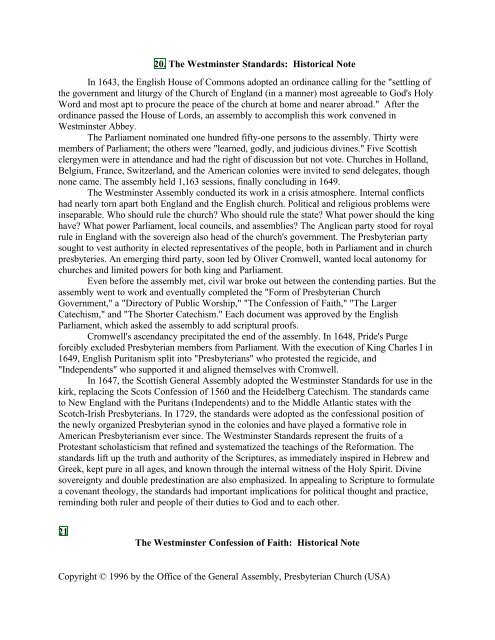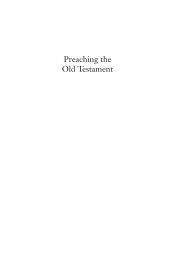The Book of Confessions - The Presbyterian Leader
The Book of Confessions - The Presbyterian Leader
The Book of Confessions - The Presbyterian Leader
Create successful ePaper yourself
Turn your PDF publications into a flip-book with our unique Google optimized e-Paper software.
20. <strong>The</strong> Westminster Standards: Historical Note<br />
In 1643, the English House <strong>of</strong> Commons adopted an ordinance calling for the "settling <strong>of</strong><br />
the government and liturgy <strong>of</strong> the Church <strong>of</strong> England (in a manner) most agreeable to God's Holy<br />
Word and most apt to procure the peace <strong>of</strong> the church at home and nearer abroad." After the<br />
ordinance passed the House <strong>of</strong> Lords, an assembly to accomplish this work convened in<br />
Westminster Abbey.<br />
<strong>The</strong> Parliament nominated one hundred fifty-one persons to the assembly. Thirty were<br />
members <strong>of</strong> Parliament; the others were "learned, godly, and judicious divines." Five Scottish<br />
clergymen were in attendance and had the right <strong>of</strong> discussion but not vote. Churches in Holland,<br />
Belgium, France, Switzerland, and the American colonies were invited to send delegates, though<br />
none came. <strong>The</strong> assembly held 1,163 sessions, finally concluding in 1649.<br />
<strong>The</strong> Westminster Assembly conducted its work in a crisis atmosphere. Internal conflicts<br />
had nearly torn apart both England and the English church. Political and religious problems were<br />
inseparable. Who should rule the church? Who should rule the state? What power should the king<br />
have? What power Parliament, local councils, and assemblies? <strong>The</strong> Anglican party stood for royal<br />
rule in England with the sovereign also head <strong>of</strong> the church's government. <strong>The</strong> <strong>Presbyterian</strong> party<br />
sought to vest authority in elected representatives <strong>of</strong> the people, both in Parliament and in church<br />
presbyteries. An emerging third party, soon led by Oliver Cromwell, wanted local autonomy for<br />
churches and limited powers for both king and Parliament.<br />
Even before the assembly met, civil war broke out between the contending parties. But the<br />
assembly went to work and eventually completed the "Form <strong>of</strong> <strong>Presbyterian</strong> Church<br />
Government," a "Directory <strong>of</strong> Public Worship," "<strong>The</strong> Confession <strong>of</strong> Faith," "<strong>The</strong> Larger<br />
Catechism," and "<strong>The</strong> Shorter Catechism." Each document was approved by the English<br />
Parliament, which asked the assembly to add scriptural pro<strong>of</strong>s.<br />
Cromwell's ascendancy precipitated the end <strong>of</strong> the assembly. In 1648, Pride's Purge<br />
forcibly excluded <strong>Presbyterian</strong> members from Parliament. With the execution <strong>of</strong> King Charles I in<br />
1649, English Puritanism split into "<strong>Presbyterian</strong>s" who protested the regicide, and<br />
"Independents" who supported it and aligned themselves with Cromwell.<br />
In 1647, the Scottish General Assembly adopted the Westminster Standards for use in the<br />
kirk, replacing the Scots Confession <strong>of</strong> 1560 and the Heidelberg Catechism. <strong>The</strong> standards came<br />
to New England with the Puritans (Independents) and to the Middle Atlantic states with the<br />
Scotch-Irish <strong>Presbyterian</strong>s. In 1729, the standards were adopted as the confessional position <strong>of</strong><br />
the newly organized <strong>Presbyterian</strong> synod in the colonies and have played a formative role in<br />
American <strong>Presbyterian</strong>ism ever since. <strong>The</strong> Westminster Standards represent the fruits <strong>of</strong> a<br />
Protestant scholasticism that refined and systematized the teachings <strong>of</strong> the Reformation. <strong>The</strong><br />
standards lift up the truth and authority <strong>of</strong> the Scriptures, as immediately inspired in Hebrew and<br />
Greek, kept pure in all ages, and known through the internal witness <strong>of</strong> the Holy Spirit. Divine<br />
sovereignty and double predestination are also emphasized. In appealing to Scripture to formulate<br />
a covenant theology, the standards had important implications for political thought and practice,<br />
reminding both ruler and people <strong>of</strong> their duties to God and to each other.<br />
21<br />
<strong>The</strong> Westminster Confession <strong>of</strong> Faith: Historical Note<br />
Copyright © 1996 by the Office <strong>of</strong> the General Assembly, <strong>Presbyterian</strong> Church (USA)




